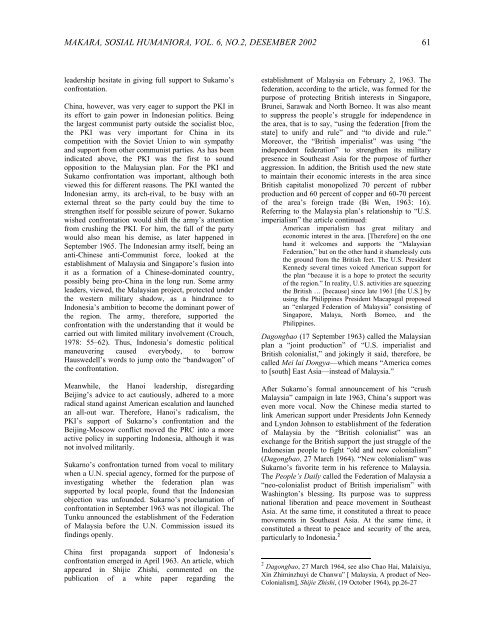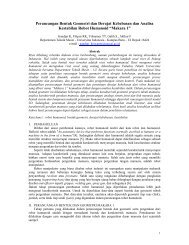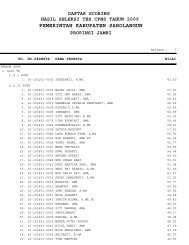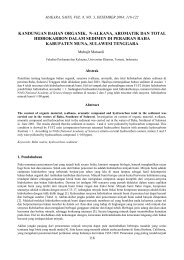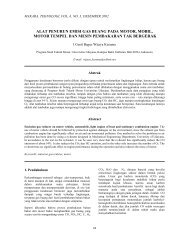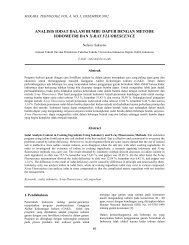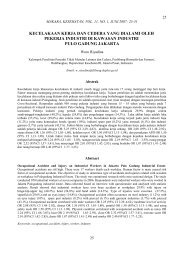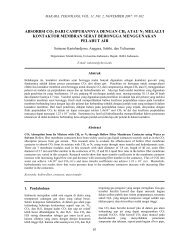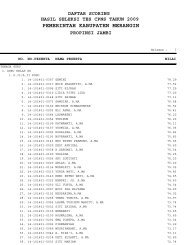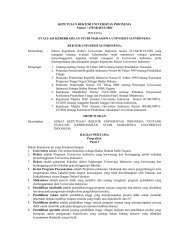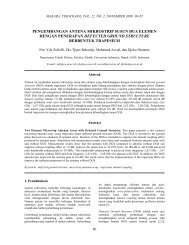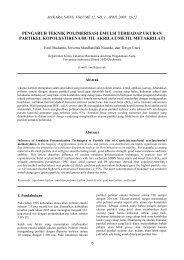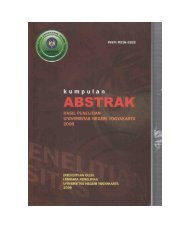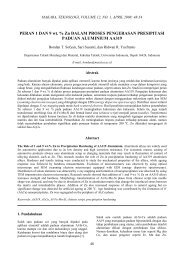“crush malaysia” campaign - Repository UI - Universitas Indonesia
“crush malaysia” campaign - Repository UI - Universitas Indonesia
“crush malaysia” campaign - Repository UI - Universitas Indonesia
You also want an ePaper? Increase the reach of your titles
YUMPU automatically turns print PDFs into web optimized ePapers that Google loves.
MAKARA, SOSIAL HUMANIORA, VOL. 6, NO.2, DESEMBER 2002 61<br />
leadership hesitate in giving full support to Sukarno’s<br />
confrontation.<br />
China, however, was very eager to support the PKI in<br />
its effort to gain power in <strong>Indonesia</strong>n politics. Being<br />
the largest communist party outside the socialist bloc,<br />
the PKI was very important for China in its<br />
competition with the Soviet Union to win sympathy<br />
and support from other communist parties. As has been<br />
indicated above, the PKI was the first to sound<br />
opposition to the Malaysian plan. For the PKI and<br />
Sukarno confrontation was important, although both<br />
viewed this for different reasons. The PKI wanted the<br />
<strong>Indonesia</strong>n army, its arch-rival, to be busy with an<br />
external threat so the party could buy the time to<br />
strengthen itself for possible seizure of power. Sukarno<br />
wished confrontation would shift the army’s attention<br />
from crushing the PKI. For him, the fall of the party<br />
would also mean his demise, as later happened in<br />
September 1965. The <strong>Indonesia</strong>n army itself, being an<br />
anti-Chinese anti-Communist force, looked at the<br />
establishment of Malaysia and Singapore’s fusion into<br />
it as a formation of a Chinese-dominated country,<br />
possibly being pro-China in the long run. Some army<br />
leaders, viewed, the Malaysian project, protected under<br />
the western military shadow, as a hindrance to<br />
<strong>Indonesia</strong>’s ambition to become the dominant power of<br />
the region. The army, therefore, supported the<br />
confrontation with the understanding that it would be<br />
carried out with limited military involvement (Crouch,<br />
1978: 55–62). Thus, <strong>Indonesia</strong>’s domestic political<br />
maneuvering caused everybody, to borrow<br />
Hauswedell’s words to jump onto the “bandwagon” of<br />
the confrontation.<br />
Meanwhile, the Hanoi leadership, disregarding<br />
Beijing’s advice to act cautiously, adhered to a more<br />
radical stand against American escalation and launched<br />
an all-out war. Therefore, Hanoi’s radicalism, the<br />
PKI’s support of Sukarno’s confrontation and the<br />
Beijing-Moscow conflict moved the PRC into a more<br />
active policy in supporting <strong>Indonesia</strong>, although it was<br />
not involved militarily.<br />
Sukarno’s confrontation turned from vocal to military<br />
when a U.N. special agency, formed for the purpose of<br />
investigating whether the federation plan was<br />
supported by local people, found that the <strong>Indonesia</strong>n<br />
objection was unfounded. Sukarno’s proclamation of<br />
confrontation in September 1963 was not illogical. The<br />
Tunku announced the establishment of the Federation<br />
of Malaysia before the U.N. Commission issued its<br />
findings openly.<br />
China first propaganda support of <strong>Indonesia</strong>’s<br />
confrontation emerged in April 1963. An article, which<br />
appeared in Shijie Zhishi, commented on the<br />
publication of a white paper regarding the<br />
establishment of Malaysia on February 2, 1963. The<br />
federation, according to the article, was formed for the<br />
purpose of protecting British interests in Singapore,<br />
Brunei, Sarawak and North Borneo. It was also meant<br />
to suppress the people’s struggle for independence in<br />
the area, that is to say, “using the federation [from the<br />
state] to unify and rule” and “to divide and rule.”<br />
Moreover, the “British imperialist” was using “the<br />
independent federation” to strengthen its military<br />
presence in Southeast Asia for the purpose of further<br />
aggression. In addition, the British used the new state<br />
to maintain their economic interests in the area since<br />
British capitalist monopolized 70 percent of rubber<br />
production and 60 percent of copper and 60-70 percent<br />
of the area’s foreign trade (Bi Wen, 1963: 16).<br />
Referring to the Malaysia plan’s relationship to “U.S.<br />
imperialism” the article continued:<br />
American imperialism has great military and<br />
economic interest in the area. [Therefore] on the one<br />
hand it welcomes and supports the “Malaysian<br />
Federation,” but on the other hand it shamelessly cuts<br />
the ground from the British feet. The U.S. President<br />
Kennedy several times voiced American support for<br />
the plan “because it is a hope to protect the security<br />
of the region.” In reality, U.S. activities are squeezing<br />
the British … [because] since late 1961 [the U.S.] by<br />
using the Philippines President Macapagal proposed<br />
an “enlarged Federation of Malaysia” consisting of<br />
Singapore, Malaya, North Borneo, and the<br />
Philippines.<br />
Dagongbao (17 September 1963) called the Malaysian<br />
plan a “joint production” of “U.S. imperialist and<br />
British colonialist,” and jokingly it said, therefore, be<br />
called Mei lai Dongya—which means “America comes<br />
to [south] East Asia—instead of Malaysia.”<br />
After Sukarno’s formal announcement of his <strong>“crush</strong><br />
Malaysia” <strong>campaign</strong> in late 1963, China’s support was<br />
even more vocal. Now the Chinese media started to<br />
link American support under Presidents John Kennedy<br />
and Lyndon Johnson to establishment of the federation<br />
of Malaysia by the “British colonialist” was an<br />
exchange for the British support the just struggle of the<br />
<strong>Indonesia</strong>n people to fight “old and new colonialism”<br />
(Dagongbao, 27 March 1964). “New colonialism” was<br />
Sukarno’s favorite term in his reference to Malaysia.<br />
The People’s Daily called the Federation of Malaysia a<br />
“neo-colonialist product of British imperialism” with<br />
Washington’s blessing. Its purpose was to suppress<br />
national liberation and peace movement in Southeast<br />
Asia. At the same time, it constituted a threat to peace<br />
movements in Southeast Asia. At the same time, it<br />
constituted a threat to peace and security of the area,<br />
particularly to <strong>Indonesia</strong>. 2<br />
2 Dagongbao, 27 March 1964, see also Chao Hai, Malaixiya,<br />
Xin Zhiminzhuyi de Chanwu” [ Malaysia, A product of Neo-<br />
Colonialism], Shijie Zhishi, (19 October 1964), pp.26-27


